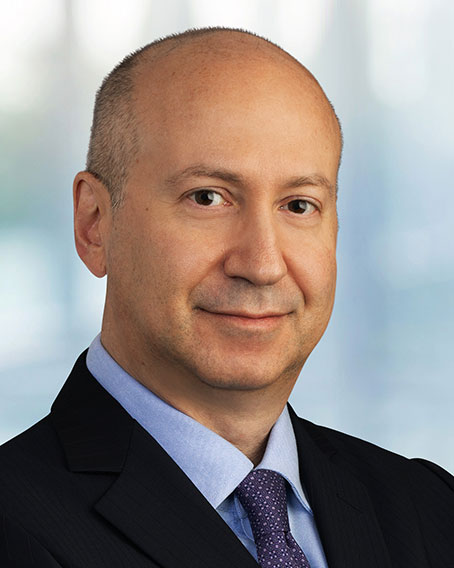As both outside and in-house counsel, Evan Gourvitz has successfully litigated and counseled clients on intellectual property disputes for more than 25 years.
He has handled copyright, trademark, patent, trade secret, false advertising, right of publicity, and name/image/likeness (NIL) disputes, as well as First Amendment and general commercial litigation, in federal and state courts and before the Trademark Trial and Appeal Board and International Trade Commission, for clients in the finance, technology, consumer products, entertainment, publishing, fashion, alcoholic beverage, and pharmaceutical industries, among others.
Evan has particular experience with social media, with which he has been involved both personally and professionally for more than 30 years. He regularly advises clients on cutting-edge Internet, digital, and tech issues, including Artificial Intelligence (AI), large language models (LLMs), and machine learning; takedown requests and the removal of infringing, libelous, and offensive materials from the Internet; the use of trademarks and celebrity names and images on social media; dealing with copyright trolls in a cost-effective manner; cybersquatting and cyberfraud; UDRP proceedings to recover infringing domain names; doxing, deepfakes, impersonation, and cybersecurity hygiene; cryptocurrency, NFTs, the Metaverse, and Web3; social media reputation management; and how to prevent disputes from “going viral.”
A recognized thought leader on IP-related topics, Evan has written and been quoted in publications including The New York Times, World IP Review, Bloomberg Law, and Law360, and has presented in venues including the International Trademark Association Annual Meeting (INTA), the American Intellectual Property Law Association (AIPLA) Annual Conference, the Center for Intellectual Property x Innovation Policy Annual Conference, and the MIT Sloan School of Management, among others.
Experience
- Regularly advises and represents private equity firms, including Bain Capital, Gauge Capital, Sequoia Capital, TPG Capital, TSG Consumer Partners, and their portfolio companies, on and in connection with copyright, trademark, and social media disputes, transactions, and related matters.
- Regularly assists Boston Children’s Hospital with takedowns and social media issues.
- Regularly advises and represents the Harvard Law Review Association in copyright and trademark disputes concerning The Bluebook: A Uniform System of Citation.
- TPG Inc. and Tarrant Capital IP, LLC v. Santa Barbara Tax Products Group, LLC. Brought action for trademark infringement and related claims against third party using TPG marks in connection with financial services.
- Certain Furniture Products Finished with Decorative Wood Grain Paper and Components Thereof. Defended Walker Edison Furniture Company, LLC against a copyright infringement claim before the U.S. International Trade Commission concerning the wood grain pattern applied to its ready-to-assemble furniture. Successfully resolved via consent order at minimal cost to client.
- Pogi Beauty LLC v. UOMA Beauty Inc. Brought action for trademark infringement and related claims against third party using variation of the client’s GO OFF mark in connection with makeup remover products.
- Healing on the Fly v. Project Healing Waters Fly Fishing. Successfully defended a charity providing rehabilitative services to wounded veterans against a former employee who opposed its attempt to register HEALING ON THE FLY for charitable fundraising services.
- RLP Ventures v. All Hands Instruction. Successfully moved to dismiss trademark infringement action and petition to cancel client’s registration with prejudice on the basis of issue preclusion and lack of subject matter jurisdiction.
- Michael Grecco Productions v. Netease Information Technology. Successfully moved to dismiss copyright infringement claim brought against client based on improper venue.
- Bureau National Interprofessionnel Du Cognac v. Prowood Wine & Spirits, Inc. Successfully represented our client in a federal district court case involving the sale of a third-party product, “Arman Cognac,” that was not genuine Cognac.
- Invista North America S.a. R.I. v. Hanwha Corporation. Successfully defended Hanwha in an opposition proceeding, permitting it to register its word-and-design mark for renewable energy services.
- Hogarth v. Edgar Rice Burroughs, Inc. Successfully defended the owner of all existing rights in the Tarzan character, in the trial court and on appeal, against claims that the copyrights in two Tarzan books were owned by the artist rather than Burroughs.
- Creative Arts by Calloway, LLC v. Brooks. Successfully defended Cab Calloway's grandson, in the trial court and on appeal, against multiple attempts by his grandfather’s widow, her family, and their company to prevent him from performing his grandfather's music as "The Cab Calloway Orchestra."
- Overbeck Corp. v. Overbeck GmbH. After a full trial on trademark infringement and dilution claims, prevailed on motion to strike a jury verdict against German company, its parent, and its U.S. affiliate.
- Walker v. DC Comics. Successfully defended comics publisher from claim that its comic “Superman: Last Son of Earth” infringed plaintiff’s purported rights in an unsolicited story idea submitted to DC.
- Sapon v. DC Comics. Successfully defended comics publisher from claim that its “Batman Beyond” character design infringed plaintiff’s purported rights in an unsolicited design submitted to DC.
- Brooks v. Creative Arts by Calloway, LLC. Successfully opposed application to register the trademark CAB CALLOWAY based on prior common law use of the mark THE CAB CALLOWAY ORCHESTRA by Cab Calloway's grandson.
- Lacoste Alligator, S.A. v. Maxoly, Inc. Successfully opposed application to register alligator design mark based on prior registrations for and rights in Lacoste alligator design marks.
- PepsiCo, Inc. v. “The Holy See.” In administrative proceeding before the World Intellectual Property Organization, acquired various PEPSI-formative domain names from an anonymous squatter that claimed its use was for political speech.

